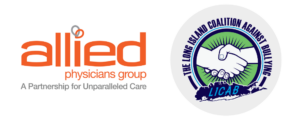Bullying Resources

Bullying is unfortunately far too common with more than 20% of kids saying they have been bullied. Our goal is not only to see that percentage shrink to zero, but to provide support and resources to children effected until it does. That is why we have partnered with the Long Island Coalition Against Bullying (LICAB) to help our families through what may seem like a hopeless time. LICAB’s mission to combat bullying provides education, programs, services, and therapeutic outlets to the children and families in our communities. We are proud to partner in this initiative.
What is Bullying and What Forms Can it Take?
Bullying IS:
- Unwanted and aggressive behavior
- Intended to cause harm
- Repeated over time
- Specific in motivation
Teasing VS. Bullying
Teasing
• Not intended to be harmful
• Pokes fun in a clever, lighthearted
way
• Maintains the dignity of everyone
involved
• Meant to get both parties laughing
• Motivation is innocent
• Stops when the person being teased
objects or asks to stop
• Laughing WITH someone
Bullying
• Intending to cause harm
• Intending to humiliate and be cruel
• Demeaning or bigoted designed as
a joke
• Meant to diminish self worth
• Based upon imbalances of power
• Continued repeatedly and meant
to cause fear of further behavior
• Laughing AT someone
Bullying can be:
Verbal
Using words to harass, name calling, taunting, inappropriate comments, and threats
Physical
Using direct contact, pushing, kicking, hitting, pinching, spitting, tripping, and destruction of property
Cyber/Digital
Using electronics such as apps, messaging, sharing inappropriate pictures and videos
Mental/Relational
Using social impacts, excluding, rumors, and gossip
Warning Signs of Bullying
- Lost or ruined possessions
- Unexplained injuries
- Sudden illnesses like stomach aches and headaches (often fabricated)
- Changes in appetite
- Avoiding socializing
- Changes in school performance
- Self destructive behavior
*Not all children who are being bullied will exhibit these signs and these signs can also be indicative of other mental health issues. Recognizing warning signs of bullying is crucial as most kids will not ask for help on their own.
Speaking to a Child About Bullying
- Remain open and non-judgmental
- Be conversational NOT like an interrogation
- Use open ended questions like:
- What does bullying mean to you?
- Why do you think kids bully?
- What does your school do about bullying?
- Thank them for trusting you – most kids prefer to speak to a friend over a adult or parent
*Most children experiencing bullying will not come forward on their own out of fear and embarrassment. Navigating the conversation in an open and non-judgmental way is important to obtaining the truth about what they are experiencing.
How can Allied & LICAB Help?
- Your Allied physician will discuss options with our families, in many cases reach out to LICAB for assistance
- One on One Support with a trained response agent who will assist in providing positive strategies
- Smile Packages full of all of the items that a child likes sent complimentary to their door
- Personal Development Programs:
- Therapy/Mental Health referrals and financial subsidies
- Tutoring referrals and financial subsidies
- Martial arts, dance and other confidence and self-esteem building program referrals
*All LICAB services are offered free of charge for families of children effected by bullying.
